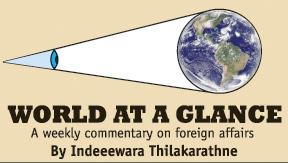|

Over 1,000 killed in Japan tsunami
The massive earthquake and tsunami in Japan dominated global news.
According to reports, the death toll from the massive earthquake and
tsunami that hit Japan on Friday is expected to rise above 1,000 as the
first damage estimates place the cost at tens of billions of US dollars.
The stock market fell by eight percent following the quake, but rose
later. Tohoku, the north-east region of Honshu island, where the quake
struck hardest, accounts for eight percent of the country's GDP.
On Saturday, Japan's Prime Minister Naoto Kan ordered an evacuation
zone around the Fukushima nuclear power plant from 3km to 10km amid
fears of a radioactive leak.
Tens of thousands of residents of Northern Japan spent the night in
shelters, contemplating the destruction and death as a series of
aftershocks from the largest quake ever to hit Japan continued to shake
the nation.
According to Reuters, "Several nuclear power reactors in Japan shut
down as designed following the massive earthquake off the nation's
northwest coast, but the failure of a back-up power generator at one
unit risks a radioactive leak."
The Economist provides a good picture of the calamity with a
background on tsunamis and the 8.9-magnitude quake which took place on
Friday.
"Beneath the Japanese archipelago lies a mythical catfish, brutish
and capricious. For most of the time, its head is pinned down by a
granite keystone, held in place by the Shinto god of the earth. But
occasionally, the god drops his guard. Then the fish thrashes,
convulsing the earth. Mid-afternoon on March 11, a massive earthquake
erupted, 24 kilometres (15 miles) down, off the north-east coast of
Japan's main island. A tsunami followed. Cars, ships and buildings were
swept away. People in Tokyo, 370 kilometres away, poured out of
buildings as high-rises swayed. An anxious roar went up in the shopping
district of Omote-Sando as the first of the aftershocks struck. After
wreaking damage along low-lying parts of the coast, the tsunami rolled
across the Pacific, testing the Pacific-wide early-warning system set up
after the Boxing Day tsunami in 2004. Shares and the yen both fell".
This 8.9-magnitude quake has been described as the biggest on record
in tremor-prone Japan. NHK, the national broadcaster, has uncertain
reports on the number of dead and missing, but the combined totals are
believed to be in the hundreds. The broadcaster says whole villages in
parts of Japan's north-eastern Pacific Coast were swept away by a
tsunami reaching seven metres high. Images showed waves churning through
hamlets in the flat farming communities near the sea, carrying ships,
buses and houses far inland. In Ishinomaki, Miyagi prefecture, a ship
with 100 people aboard was washed away. Their whereabouts are unknown.
One giant wave washed through an airport in Sendai, the capital of
Miyagi, leaving 1,300 people stranded on its upper floors.
The Japanese are drilled from childhood to deal with quakes. Coping
with the chaos of the real thing is another matter. Bullet-train
services were immediately halted. A huge fire blazed at an oil refinery
on Tokyo's outskirts and at least 50 fires have been reported elsewhere,
including at factories belonging to Nissan and Sumitomo Metal. In Japan
the fires caused by earthquakes, rather than the quakes themselves, are
usually the main killers. However, modern industries bring other
earthquake-related concerns. At about 10 p.m. local time, Yukio Edano,
the Chief Cabinet Secretary, issued a nuclear emergency warning for the
Fukushima First Nuclear Power Plant in Fukushima prefecture. He said
people within a 3km radius were being ordered to evacuate, while those
living between 3km and 10km away were instructed to stay in their
houses.
The opposition Liberal Democratic Party, which has been doing its
level best in recent weeks to topple the government of Naoto Kan, the
Prime Minister, now says it will co-operate fully, including supporting
special spending measures.
Tsunami warnings continue to be broadcast repeatedly on television.
Across Japan, millions braced for a miserable night of uncertainty.
Electricity firms reported that in northern Japan, many homes were
without power or phone lines; in the same area, snow is falling, and TV
images showed people in evacuation shelters huddling in blankets. Tokyo
got off relatively lightly, though most public transport ground to a
halt, forcing commuters to walk often huge distances home. Shelves in
the capital's convenience stores were almost bare, with long lines of
people attempting to buy snacks and drinks.
But it is worth bearing in mind that this is not the huge earthquake
that seismologists say is long overdue in Tokyo. That is expected to
ripple up from Shizuoka in the south. Tokyo sits above two faultlines
and near another. Just south-west of the city, the Philippine Sea plate
dives down under the Eurasian continental plate; right under the city,
the Pacific plate dives under that.
The 6.8-magnitude Hanshin earthquake that struck Kobe in 1995 killed
6,400. The cost was placed at Yen 10 trillion ($100 billion). Industrial
production dipped only briefly..." states The Economist.
US and EU demand that Gaddafi leaves
 Another
major story that dominated world headlines was the crisis in Libya. The
latest is the US and EU demanding that Gaddafi should immediately
relinquish his political powers. Another
major story that dominated world headlines was the crisis in Libya. The
latest is the US and EU demanding that Gaddafi should immediately
relinquish his political powers.
The US and the EU have again called on the Libyan leader Col Muammar
Gaddafi to step down. US President Barack Obama said the US would take a
wide range of actions to ensure Col Gaddafi surrenders power.
EU leaders meeting in Brussels agreed to 'examine all necessary
options' to protect the civilian population in Libya.
"British and French leaders had wanted leaders of the European
Union's 27 Member States to draw up plans to prepare to help the Libyan
rebellion, including the possibility of a no-fly zone.
This would prevent pro-Gaddafi troops launching attacks from the air
- currently the primary advantage the regime's troops have as they push
back the rebel forces," the BBC reported.
|

